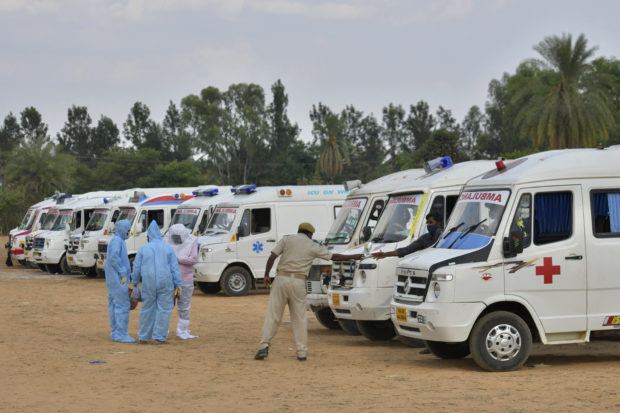Variant accelerating India’s COVID explosion: WHO top scientist

Family members and relatives wearing protective gear stand next to ambulances carrying the bodies of victims who died of the Covid-19 coronavirus at an open air crematorium set up for the coronavirus victims inside a defunct granite quarry on the outskirts of Bangalore on May 8, 2021, as India recorded more than 4,000 coronavirus deaths in a day for the first time. ( AFP)
GENEVA, Switzerland – A COVID-19 variant spreading in India is more contagious and may be dodging vaccine protections, contributing to the country’s explosive outbreak, the World Health Organization’s chief scientist said Saturday.
In an interview with AFP, Soumya Swaminathan warned that “the epidemiological features that we see in India today do indicate that it’s an extremely rapidly spreading variant”.
India on Saturday for the first time registered more than 4,000 COVID-19 deaths in just 24 hours, and more than 400,000 new infections.
New Delhi has struggled to contain the outbreak, which has overwhelmed its healthcare system, and many experts suspect the official death and case numbers are a gross underestimate.
Swaminathan, an Indian paediatrician and clinical scientist, said the B.1.617 variant of COVID-19, which was first detected in India last October, was clearly a contributing factor to the catastrophe unfolding in her homeland.
“There have been many accelerators that are fed into this,” the 62-year-old said, stressing that “a more rapidly spreading virus is one of them”.
The WHO recently listed B.1.617 — which counts several sub-lineages with slightly different mutations and characteristics — as a “variant of interest”.
Resistant to antibodies?
But so far it has stopped short of adding it to its short list of “variant of concern” — a label indicating it is more dangerous than the original version of the virus by being more transmissible, deadly or able to get past vaccine protections.
Several national health authorities, including in the United States and Britain, have meanwhile said they consider B.1.617 a variant of concern, and Swaminathan said she expected the WHO to soon follow suit.
“B 1.617 is likely to be a variant of concern because it has some mutations which increase transmission, and which also potentially could make (it) resistant to antibodies that are generated by vaccination or by natural infection,” she said.
But she insisted that the variant alone could not be blamed for the dramatic surge in cases and deaths seen in India, lamenting that the country appeared to have let down its guard down, with “huge social mixing and large gatherings”.
Mass election rallies held by Prime Minister Narendra Modi and other politicians have for instance partly been blamed for the staggering rise in infections.
But even as many in India felt the crisis was over, dropping mask-wearing and other protection measures, the virus was quietly spreading.
‘Taking off vertically’
“In a large country like India, you could have transmission at low levels, which is what happened for many months,” Swaminathan said.
“It was endemic (and) probably gradually increasing,” she said, decrying that “those early signs were missed until it reached the point at which it was taking off vertically.”
“At that point it’s very hard to suppress, because it’s then involving tens of thousands of people and it’s multiplying at a rate at which it’s very difficult to stop.”
While India is now trying to scale up vaccination to rein in the outbreak, Swaminathan warned that the jabs alone would not be enough to gain control of the situation.
She pointed out that India, the world’s largest vaccine-making nation, had only fully vaccinated around two percent of the 1.3 billion-plus population.
“It’s going to take many months if not years to get to the point of 70 to 80 percent coverage,” she said.
With that prospect, Swaminathan stressed that “for the foreseeable future, we need to depend on our tried and tested public health and social measures” to bring down transmission.
The surge in India is frightening not only due to the horrifying number of people who are sick and dying there, but also because the exploding infection numbers dramatically increase the chances of new and more dangerous variants emerging.
“The more the virus is replicating and spreading and transmitting, the more chances are that… mutations will develop and adapt,” Swaminathan said.
“Variants which accumulate a lot of mutations may ultimately become resistant to the current vaccines that we have,” she warned.
“That’s going to be a problem for the whole world.”
gsg
For more news about the novel coronavirus click here.
What you need to know about Coronavirus.
For more information on COVID-19, call the DOH Hotline: (02) 86517800 local 1149/1150.
The Inquirer Foundation supports our healthcare frontliners and is still accepting cash donations to be deposited at Banco de Oro (BDO) current account #007960018860 or donate through PayMaya using this link.














